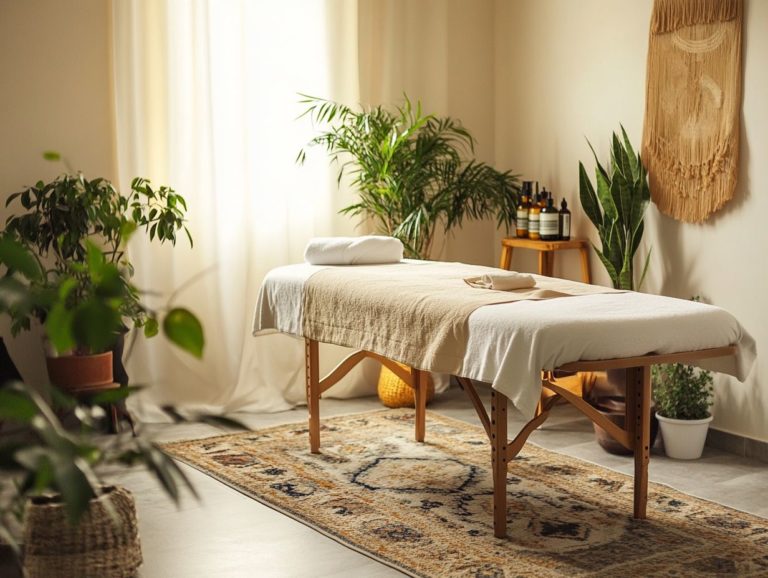10 Naturopathic Practices for Better Sleep
Sleep is crucial for your overall well-being, yet many find themselves grappling with restless nights. If you’re weary of tossing and turning, let s dive into these tips and reclaim your peaceful nights!
This article presents ten effective strategies to enhance your sleep naturally, from establishing a consistent sleep schedule to creating a calming bedtime routine that invites tranquility. You’ll also discover the benefits of natural remedies, dietary influences, and additional tips for achieving a peaceful slumber.
Bid farewell to those restless nights and welcome the rejuvenating rest you deserve!
Contents
- Key Takeaways:
- 1. Establish a Regular Sleep Schedule
- 2. Create a Relaxing Bedtime Routine
- 3. Avoid Stimulants Before Bed
- 4. Practice Mindfulness Meditation
- 5. Use Essential Oils for Aromatherapy
- 6. Try Herbal Supplements for Better Sleep
- 7. Invest in a Comfortable Mattress and Pillows
- 8. Keep Your Bedroom Dark and Cool
- 9. Limit Screen Time Before Bed
- 10. Exercise Regularly
- How Can Naturopathic Medicine Help with Sleep?
- Preguntas Frecuentes
- What Are the Top 10 Naturopathic Practices for Better Sleep?
- How Can a Bedtime Routine Improve Sleep?
- Why Should You Avoid Caffeine and Heavy Meals at Night?
- C mo contribuye un ambiente de sue o c modo a un mejor sue o?
- Cu les son algunas t cnicas de relajaci n efectivas para mejorar el sue o?
- Pueden los aceites esenciales mejorar el sue o?
Key Takeaways:

- Establish a regular sleep schedule to regulate your body’s internal clock and improve the quality of your sleep.
- Create a relaxing bedtime routine to signal to your body that it’s time to wind down and prepare for sleep.
- Avoid stimulants such as caffeine and nicotine before bed to prevent disturbances in your sleep.
1. Establish a Regular Sleep Schedule
Establishing a regular sleep schedule is essential for improving the quality of your sleep, particularly if you deal with sleep disorders.
Adhering to a consistent bedtime promotes a healthier internal clock, enhancing your overall well-being and supporting better sleep hygiene.
By setting a specific time to go to bed and wake up, you can train your body to fall asleep faster and wake up feeling more refreshed.
Making gradual adjustments to your bedtime can ease this transition, allowing for a more natural shift in your sleep patterns.
Creating a conducive sleep environment is vital. Think dimmed lights, reduced noise, and a comfortably cool room to significantly improve your ability to relax.
Incorporating relaxing rituals before bed, such as reading or meditating, further supports this routine, ultimately reducing the time it takes to fall asleep and encouraging the restorative sleep you seek.
2. Create a Relaxing Bedtime Routine
A relaxing bedtime routine is essential for winding down, as it sets the foundation for quality sleep. Incorporate calming practices like deep breathing and gentle stretching to help your body transition into relaxation.
Consider integrating activities such as reading a calming book or practicing guided meditation. These can significantly enhance your experience, quieting your mind and preparing your body for rest.
Creating a serene sleep environment, free from distractions, is also important. Dimming the lights, using soft bedding, and maintaining a comfortable room temperature contribute to a more peaceful slumber.
Incorporating aromatherapy with soothing scents like lavender helps create a tranquil atmosphere, making it easier to release the day’s stresses and settle into a restful state.
3. Avoid Stimulants Before Bed
Avoiding stimulants before bed is essential for enhancing your sleep quality. Substances like caffeine and nicotine can disrupt your rest and worsen sleep disorders such as insomnia.
These stimulants interfere with your body s natural ability to wind down, making it difficult to both fall asleep and stay asleep through the night. The effects can linger, so it s crucial to be mindful of when you consume them.
For example, caffeine often found in coffee, tea, and various soft drinks can remain active in your system for several hours. It s wise to limit your intake to the morning or early afternoon.
Similarly, nicotine, commonly found in tobacco products, not only keeps you alert but can also lead to more frequent awakenings at night. To promote better sleep habits, consider switching to herbal teas or decaffeinated beverages in the evening and establish a calming bedtime routine.
4. Practice Mindfulness Meditation
Practicing mindfulness meditation can significantly enhance your sleep quality by fostering relaxation and easing anxiety. This makes it an effective approach for anyone dealing with chronic pain or sleep disorders.
Incorporating simple techniques like focused breathing and body scans into your nightly routine can amplify the benefits of this practice. By dedicating just a few minutes each evening to mindfulness, you can train your mind to slow down, making it easier to transition into restorative sleep.
When combined with cognitive behavioral therapy, mindfulness offers a complete approach that helps both your mind and body. This strategy addresses various aspects of sleep difficulties, leading to improved outcomes. Understanding your thought patterns while nurturing a calm mindset is essential for restful slumber.
5. Use Essential Oils for Aromatherapy

Using essential oils for aromatherapy can transform your sleep space into a serene oasis. Lavender stands out for its well-known sleep-inducing properties, promoting relaxation and facilitating deep, restful slumber.
Lavender is just one of many essential oils that can improve your sleep. For instance, chamomile is celebrated for enhancing sleep quality and reducing anxiety, while cedarwood is effective in decreasing restlessness, creating a soothing atmosphere.
Recent studies suggest that diffusing these oils in your bedroom or incorporating them into your bedtime routine like adding drops to baths or pillowcases can significantly elevate your sleep quality. A harmonious blend of bergamot and ylang-ylang may also calm your mind, making it easier to drift off.
These natural remedies can become vital components of your holistic approach to achieving better sleep, including the benefits of naturopathy for sleep disorders.
6. Try Herbal Supplements for Better Sleep
Incorporating herbal supplements like valerian root and passion flower into your routine offers a natural way to boost sleep quality, acting as effective sleep aids without the unwanted side effects of traditional medications.
These herbs interact with your body in different ways to foster restful sleep. Valerian root is known for its ability to increase gamma-aminobutyric acid (GABA) a natural brain chemical that helps calm you down. Passion flower may also enhance serotonin production, improving mood and relaxation.
Typical dosages suggest taking valerian root at 300 to 600 mg about an hour before bedtime, while a 150 mg dose of passion flower can provide similar calming effects.
Both herbal supplements can enhance a well-rounded sleep strategy that includes good sleep hygiene, mindfulness practices, and thoughtful dietary choices, paving a balanced path towards restful nights.
7. Invest in a Comfortable Mattress and Pillows
Investing in a comfortable mattress and supportive pillows is essential for creating a sleep environment that fosters quality rest.
The right mattress can greatly affect your sleep quality, with various materials and firmness levels tailored to your unique needs.
If you re a side sleeper, a softer mattress may be your best ally, alleviating pressure points for enhanced comfort. Conversely, back sleepers usually prefer firmer options to ensure proper spinal alignment.
Your choice of pillows should also reflect these preferences; larger body pillows can benefit side sleepers, while thinner pillows typically suit those who sleep on their backs or stomachs.
Ultimately, assessing your comfort and matching your mattress and pillow choices to your sleeping position can transform your sleep experience into something truly rejuvenating.
8. Keep Your Bedroom Dark and Cool
Keeping your bedroom dark and cool is crucial for creating the perfect sleep environment. This allows you to regulate your body’s natural sleep-wake cycle and enhances your overall sleep quality.
To make this happen, consider installing blackout curtains. They do wonders in blocking out intrusive light from streetlamps or the early morning sun.
This simple addition can transform your space into a serene haven, ideal for rest. Maintaining a comfortable temperature is just as important.
Experts recommend keeping your room between 60 to 67 degrees Fahrenheit for optimal sleep. Utilizing a fan or air conditioning can help you achieve this perfect climate.
Pay attention to your light exposure throughout the day. Reducing screen time in the evening sends a signal to your body that it s time to unwind, further promoting restful sleep.
9. Limit Screen Time Before Bed
Limitar el tiempo de pantalla antes de dormir es esencial para mejorar la calidad del sue o, ya que la exposici n a la luz azul puede interrumpir el ciclo natural de sue o-vigilia de tu cuerpo y empeorar los trastornos del sue o.
Esta interrupci n ocurre porque la luz azul dificulta la producci n de melatonina, la hormona que regula tu sue o. En consecuencia, puedes encontrar cada vez m s dif cil conciliar el sue o o mantener un sue o reparador durante la noche.
Para combatir esto, considera establecer un toque de queda digital, idealmente, de dos a tres horas antes de la hora de dormir. En lugar de desplazarte por los dispositivos, por qu no disfrutar de alternativas m s relajantes?
- Leer un libro f sico
- Practicar meditaci n
- Disfrutar de m sica relajante
Estas actividades relajantes no solo fomentan un mejor descanso nocturno, sino que tambi n mejoran tu higiene del sue o en general. Allana el camino para un bienestar mejorado!
10. Exercise Regularly

Engaging in regular physical activity will boost your sleep quality and help alleviate long-term pain and sleep problems while promoting overall health.
Research suggests that moderate aerobic exercises like walking or cycling when done consistently, can reduce sleep latency. This allows you to drift off more quickly.
Strength training also plays a crucial role, fostering relaxation and reducing anxiety levels. Timing is key; exercising earlier in the day tends to yield the best results.
Vigorous workouts close to bedtime can leave you feeling too alert to sleep. Finding the right balance between activity and rest is essential.
Remember, excessive exercise can lead to fatigue and might ironically disrupt your sleep patterns.
How Can Naturopathic Medicine Help with Sleep?
Naturopathic medicine presents a holistic approach to tackling sleep disorders, incorporating homeopathic tips for better sleep. It emphasizes natural strategies and effective treatments tailored to your unique needs and health conditions.
By integrating various modalities, including herbal supplements, dietary adjustments, and personalized lifestyle changes, practitioners aim to alleviate symptoms and uncover the root causes of your sleep issues. Exploring effective mind-body techniques for better sleep can also be beneficial.
For instance, incorporating adaptogenic herbs like ashwagandha may help reduce stress levels. A balanced diet rich in magnesium can promote muscle relaxation and overall tranquility.
Even minor lifestyle tweaks, such as practicing mindfulness or establishing a consistent bedtime routine, can create an environment that fosters restorative slumber.
Together, these elements form a comprehensive approach that nurtures both your mind and body, ultimately leading to improved sleep quality.
What Are the Common Causes of Sleep Disturbances?
Common causes of sleep disturbances include insomnia, anxiety, and chronic pain factors that can severely undermine your sleep quality and, by extension, your overall health.
These issues often weave together, forming a cycle that complicates your ability to enjoy restorative sleep. Consider how factors like excessive screen time before bed, irregular sleep schedules, and the consumption of caffeine or alcohol can intensify these conditions.
Medical concerns such as sleep apnea or restless leg syndrome also play a role in disrupting your slumber. Psychological challenges, including stress and depression, can hinder your ability to achieve deep, uninterrupted sleep.
To tackle these disturbances, try establishing a consistent bedtime routine, practicing relaxation techniques, and seeking professional help when necessary. These strategies can prove invaluable in reclaiming your restful nights.
What Are the Benefits of Using Natural Remedies for Sleep?
Using natural remedies for sleep can offer you many benefits, from improving the quality of your sleep to having fewer side effects than conventional sleep aids. This approach embraces a holistic way of managing sleep disorders.
Many people have found success with herbal treatments such as valerian root and chamomile, known for their calming effects. Supplements like magnesium and melatonin, the hormone that helps you sleep, have gained popularity for effectively regulating sleep cycles.
In addition to these remedies, consider lifestyle adjustments. Establishing a soothing bedtime routine, reducing screen time, and practicing mindfulness, along with exploring energy healing techniques for better sleep, can significantly enhance your sleep experience.
There s a wealth of personal testimonials from individuals who have felt the transformative power of these natural remedies. They report restful nights and improved overall well-being, supported by research that highlights the gentle effects of natural solutions on sleep health.
How Can Diet and Nutrition Affect Sleep?
Diet and nutrition are crucial in determining the quality of your sleep. Certain foods and nutrients can either enhance your sleep or contribute to disturbances. Making informed choices is key to achieving better rest.
For instance, incorporating magnesium-rich foods like spinach, almonds, and black beans can help relax your body and prepare it for a peaceful night. The amino acid tryptophan, found in turkey and dairy products, promotes melatonin production, which your body craves for good sleep.
On the other hand, too much caffeine or heavy meals right before bedtime can lead to restless nights. Opting for herbal teas such as chamomile or valerian root can transform your evening routine. These calming beverages not only soothe but also create a tranquil sleep environment.
By focusing on these dietary choices, you can establish a nighttime ritual that fosters restorative sleep.
What Are Some Additional Tips for Better Sleep?

Along with well-known techniques, you can significantly enhance your sleep quality and well-being by implementing extra tips, such as adjusting your bedtime and engaging in calming practices.
Establishing a consistent sleep schedule, reducing screen time before bed, and creating a relaxing bedtime routine can be particularly effective. Engaging in mindfulness or gentle yoga can help your body transition into a restful state.
You’ll love how developing a personalized sleep plan that considers your unique lifestyle and preferences can transform your nights! This could include:
- Keeping a sleep diary to track your patterns
- Adjusting your sleep environment for maximum comfort
- Incorporating calming aromas like lavender to signal that it s time to unwind
By taking these extra steps, you can create an environment that promotes deeper, more restorative sleep.
Preguntas Frecuentes
What Are the Top 10 Naturopathic Practices for Better Sleep?
The top 10 naturopathic practices for better sleep include: establishing a bedtime routine, avoiding caffeine and heavy meals at night, creating a comfortable sleep environment, practicing relaxation techniques, incorporating essential oils, using herbal supplements, limiting screen time before bed, exercising regularly, reducing stress levels, and maintaining a consistent sleep schedule. Additionally, exploring integrative health practices for better sleep can enhance your overall rest.
How Can a Bedtime Routine Improve Sleep?
A bedtime routine helps signal your body that it s time to relax and prepare for sleep. Activities can include taking a warm bath, reading a book, or listening to calming music. By consistently following a bedtime routine, your body learns to associate these activities with sleep, making it easier to fall asleep and stay asleep.
Why Should You Avoid Caffeine and Heavy Meals at Night?
Caffeine is a stimulant that can disrupt your body s natural sleep cycle, making it hard to fall asleep. Heavy meals, especially those high in fat and spices, can cause discomfort and heartburn, making it challenging to relax and drift off. It s best to avoid these foods in the evening and choose lighter, healthier options.
C mo contribuye un ambiente de sue o c modo a un mejor sue o?
Un ambiente de sue o c modo puede transformar la calidad de tu descanso. Aseg rate de tener un colch n y una almohada que brinden soporte.
Adem s, mant n la habitaci n oscura y fr a, y minimiza el ruido y las distracciones. Un espacio c modo promueve la relajaci n y te ayuda a mantenerte dormido toda la noche.
Cu les son algunas t cnicas de relajaci n efectivas para mejorar el sue o?
Prueba con t cnicas como la respiraci n profunda o la relajaci n muscular progresiva. Estos m todos reducen el estr s y relajan tu cuerpo, prepar ndote para dormir mejor.
Pueden los aceites esenciales mejorar el sue o?
Definitivamente! Algunos aceites esenciales pueden ser tus mejores aliados para un descanso reparador. La lavanda, la manzanilla y el bergamote son opciones populares por sus propiedades que promueven el sue o.
Recuerda usar aceites esenciales de alta calidad y diluirlos adecuadamente antes de aplicarlos.






